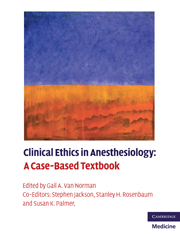Book contents
- Clinical Ethics in Anesthesiology
- Clinical Ethics in Anesthesiology
- Copyright page
- Dedication
- Contents
- Contributors
- Foreword
- Preface
- 1 Consent and refusal
- 1 Informed consent: respecting patient autonomy
- 2 Informed refusal – DNR orders in the patient undergoing anesthesia and surgery and at the end-of-life
- 3 Informed refusal – the Jehovah’s Witness patient
- 4 Surrogate decision-making
- 5 Informed consent and the pediatric patient
- 6 Do not resuscitate decisions in pediatric patients
- 7 Consent in laboring patients
- 8 Maternal–fetal conflicts: Cesarean delivery on maternal request
- 9 Consent for anesthesia for procedures with special societal implications: psychosurgery and electroconvulsive therapy
- 10 Ethical use of restraints
- 11 The use of ethics consultation regarding consent and refusal
- 12 Consent and cultural conflicts: ethical issues in pediatric anesthesiologists’ participation in female genital cutting
- 13 Communitarian values in medical decision-making: Native Americans
- 14 Informed consent for preoperative testing: pregnancy testing and other tests involving sensitive patient issues
- 2 End-of-life issues
- 3 Pain management
- 4 Research and publication
- 5 Practice issues
- 6 Anesthesiologists, the state, and society
- Index
11 - The use of ethics consultation regarding consent and refusal
from 1 - Consent and refusal
Published online by Cambridge University Press: 05 March 2012
- Clinical Ethics in Anesthesiology
- Clinical Ethics in Anesthesiology
- Copyright page
- Dedication
- Contents
- Contributors
- Foreword
- Preface
- 1 Consent and refusal
- 1 Informed consent: respecting patient autonomy
- 2 Informed refusal – DNR orders in the patient undergoing anesthesia and surgery and at the end-of-life
- 3 Informed refusal – the Jehovah’s Witness patient
- 4 Surrogate decision-making
- 5 Informed consent and the pediatric patient
- 6 Do not resuscitate decisions in pediatric patients
- 7 Consent in laboring patients
- 8 Maternal–fetal conflicts: Cesarean delivery on maternal request
- 9 Consent for anesthesia for procedures with special societal implications: psychosurgery and electroconvulsive therapy
- 10 Ethical use of restraints
- 11 The use of ethics consultation regarding consent and refusal
- 12 Consent and cultural conflicts: ethical issues in pediatric anesthesiologists’ participation in female genital cutting
- 13 Communitarian values in medical decision-making: Native Americans
- 14 Informed consent for preoperative testing: pregnancy testing and other tests involving sensitive patient issues
- 2 End-of-life issues
- 3 Pain management
- 4 Research and publication
- 5 Practice issues
- 6 Anesthesiologists, the state, and society
- Index
Summary
Keywords
- Type
- Chapter
- Information
- Clinical Ethics in AnesthesiologyA Case-Based Textbook, pp. 64 - 68Publisher: Cambridge University PressPrint publication year: 2010



